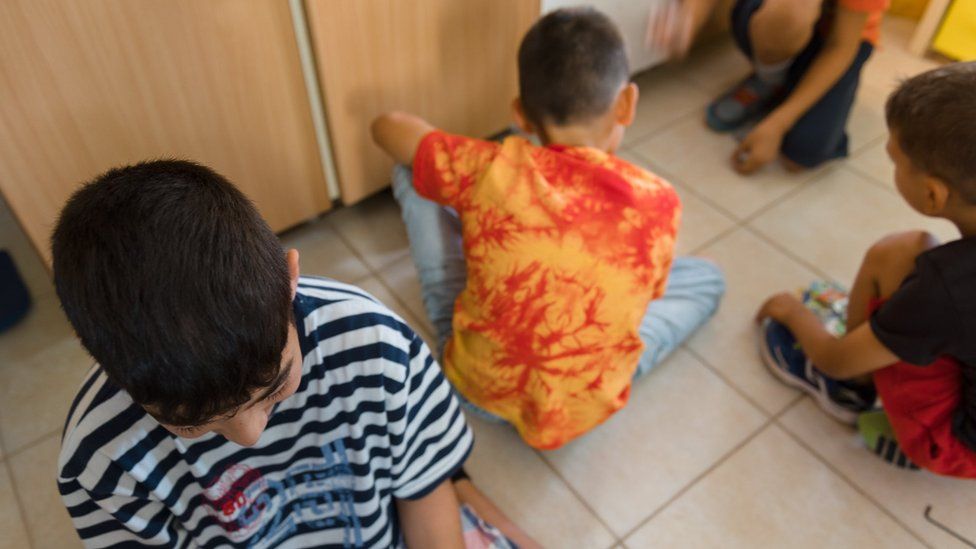Greek crisis cuts children in care adrift
- Published

On his 14th birthday, Aleksos sits quietly on the edge of his bed in a bare Athens hospital room.
He is not sick and he is not here to visit anyone, but for the past two months the Agia Sofia Children's Hospital has been his home.
He was brought here after reporting his mother to the police for abuse and neglect.
Aleksos, originally from Albania, told social workers that a mixture of alcoholism and mental health problems had made his mother physically and verbally violent.
He isn't allowed to leave the hospital for safety reasons - not even to go to school. He has his lessons inside Agia Sofia.
When children in Greece are taken into care, the current system requires them to spend a few days in hospital while they receive health checks and wait to be placed in a residential institution or foster home.
But with the country's institutions full and because of an underdeveloped foster care system, children are spending months at a time living in hospitals.
According to the Ministry of Labour, Social Security and Social Solidarity, there are currently 27 babies and 33 children living in Greek hospitals.
Greek children's charity Smile of the Child says Aleksos is one of 13 minors staying in the Agia Sofia Hospital, where the average time for children waiting to be moved to a foster home or institution is between one and four months.
The charity's chairman and co-founder, Kostas Yannopoulos says an increasing number of children are now spending a long time in an environment that he considers "inadequate for children with social problems".
Staying in the hospital for a long period of time can affect minors both physically and mentally, he says.
"First of all, they get viruses from the other children who are ill. Then [psychologically] it creates huge problems for them. They think: 'Why am I here? I was better off in the abusive environment. All the other children here have parents.'"
Not all the children living in the Agia Sofia hospital are teenagers.
Lida is just 18 months old and has been living there since her parents were brought to hospital with psychiatric problems last month.
Gaps left by the state
It has been more than six years since the start of Greece's financial crisis and since then it has seen a rapid decline in social spending.
"The welfare state, or what is left of it, is struggling to cope with demand," says Alexander Kentikelenis, a sociologist at the University of Oxford who has done extensive research on the impacts of the crisis.
"There is an increase in demand, and a decrease of supply of such services, which inevitably means that social groups that need welfare services are left without, having a tremendous impact on children," he says.
Charities are trying to fill the gaps in social support left by the state.
According to Opening Doors, an organisation that campaigns to put a stop to children growing up in institutionalised care in Europe, 22% of Greece's children's homes are run by charities or churches.
In one of Smile of the Child's 11 residential children's homes, in the sun-bleached neighbourhood of Marousi in north-east Athens, six-year-old Milos plays the piano with one hand as he eats a slice of cake with the other.
Beside him, a toddler uses the bars of her cot to pull herself upright, eager to see.
While the two of them are guaranteed a space here until they're 18, many charities say they are full to capacity and do not have the money to care for more children.
Family first
International charity SOS Children's Villages houses 275 children in Greece and has no space for more.
But Stergios Sifinios, its director of social work, says even if they had the money, they would not want to open more institutions. Instead, the charity is trying to raise funds for social centres that support families to stay together.
"This is much more important than having more and more institutions," he says. "Taking children out of the family is very bad for them."
Mr Sifinios says that on average children spend three months in hospitals, but the longest he has heard of is three years.
Theano Fotiou, deputy minister for Labour, Social Security and Social Solidarity, agrees that moving children out of hospitals "may take longer than it should".
But the government says it is trying to improve child protection services and hopes no children under three will be living either in hospitals or institutions by 2020.
Among Ms Fotiou's top priorities are promoting foster care and developing alternatives to institutional placements.
For Georgette Mulheir, who runs the charity Lumos, the real issue is ending reliance on institutions, whether hospitals, state institutions or charity-run children's homes.
In her opinion, children should not be entering hospitals at all, but having medical check-ups with a GP before being integrated into a family environment.
"The development of emergency foster care is absolutely what needs to happen," she says.
The names of all children in this article have been changed to protect their identities